 HISTORY OF THE OCP
HISTORY OF THE OCP |
OCP Ecuador S.A. has built the Heavy Crude
Oil (OCP) Pipeline, the most important project
developed in Ecuador since the 1980s.
In conjunction with OCP are six of the world's
largest oil companies and one of the world's most
prestigious construction companies. OCP Ecuador
S.A.'s goal is to transport crude oil from Nueva
Loja and Baeza to the OCP Marine Terminal in Esmeraldas.
The pipeline transports oil belonging to the
state of Ecuador (at a preferential rate) as well
as oil belonging to its partner companies and
to third parties, in accordance with the unused
transport capacity of the pipeline.
 THE OIL PIPELINE
THE OIL PIPELINE |
The OCP is a transport system constituted by
an oil pipeline with an approximate length 503
km that will connect the oil receiving Amazons
Terminal, located in Nuega Loja with the OCP maritime
terminal in the Esmeraldas Province.
The installation includes the installations necessary
for all storing, measuring, heating, pumping,
pressure reducing operations and the loading of
the heavy crude oil to vessels. Four pumping stations
are required to transport the heavy crude, crossing
the mountain range at an elevation of 4.064 meter
The OCP will operate as an independent system
with 4 storage tanks of 300.000 barrels each and
an initial pumping station, at the Amazonas Terminal.
There 3 intermediate pumping stations, an injection
system into the trunk in the pipeline at the Sardinas-Beaza
Station, two pressure reducing stations, an automatic
blocking station and five storage tanks of 750.000
barrels each, as well as facilities for the loading
of oil tankers, located at the OCP Maritime Terminal
in Esmeraldas.
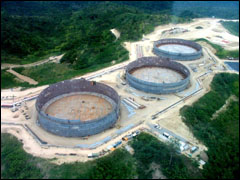
trunk in the pipeline at the Sardinas-Beaza Station,
two pressure reducing stations, an automatic blocking
station and five storage tanks of 750.000 barrels
each, as well as facilities for the loading of
oil tankers, located at the OCP Maritime Terminal
in Esmeraldas.
The contract signed between OCP Ecuador SA and
the Ecuadorian State, clearly and precisely, regulates
the planning, construction and operation of the
Heavy Crude Oil Pipeline. Throughout the terms
of the agreements, the company shall continue
to keep its condition as an Ecuadorian nationality
corporation.
 OIL PIPELINE FOR DEVELOPMENT
OIL PIPELINE FOR DEVELOPMENT |
The construction and operation of an oil pipeline
represents a great benefits to the national economy,
since it will reactivate productive mechanisms
and stabilize the financial system. The construction
of the OCP will generate approximately 7000 new
direct jobs and some 300 direct jobs by OCP. Additionally,
the investment of capital for the construction
of the OCP will generate resources for the State,
which can be reinvested in infrastructure and
social development works.
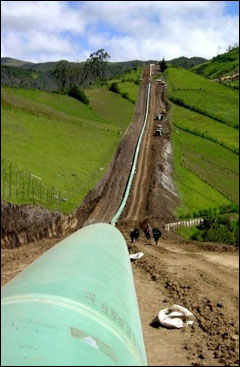
Likewise, in order to fill the new oil pipeline,
oil companies will make important investments
to develop new oil fields to improve the production
of oil fields. The exploitation and marketing
of heavy crude oils opens a new source of important
revenues for the State budget. An increase in
production implies a greater revenue from royalties,
taxes and import duties, as well as the opening
of new export markets.
Increased Exports
Along with the fall in national oil production,
exports of crude oil also decreased. Exports constituted
a daily average of 246 thousand barrels in 2001
compared to 230 thousand barrels in 2002. However,
new oil production in 2003 is planned to coincide
with the inauguration of the OCP pipeline, thereby
promoting the increase of exploration and crude
oil exports.
 OCP PARTNERS
OCP PARTNERS |
 Agip Oil Ecuador BV is part of ENI Group,
one of the most important integrated energy companies
in the world. ENI operates in oil, natural gas,
electricity generation and petrochemical industries,
as well as oil field services and engineering.
It has a strong competitive edge and leading market
positions in these businesses.
Agip Oil Ecuador BV is part of ENI Group,
one of the most important integrated energy companies
in the world. ENI operates in oil, natural gas,
electricity generation and petrochemical industries,
as well as oil field services and engineering.
It has a strong competitive edge and leading market
positions in these businesses.
 EnCana is one of the world's leading independent
oil and gas companies, with an enterprise value
of approximately C$30 billion. It is North America's
largest independent natural gas producer and gas
storage operator.
EnCana is one of the world's leading independent
oil and gas companies, with an enterprise value
of approximately C$30 billion. It is North America's
largest independent natural gas producer and gas
storage operator.
 Repsol YPF is an integrated oil and gas company
operating in oil and natural gas exploration,
development, production and transportation, as
well as in the refining and marketing of petrochemical
products, derivatives and gas.
Repsol YPF is an integrated oil and gas company
operating in oil and natural gas exploration,
development, production and transportation, as
well as in the refining and marketing of petrochemical
products, derivatives and gas.
 The Techint Group comprises more than 100
companies operating worldwide, with a workforce
of experienced. Areas of activity among others
include: engineering and construction, production
of flat steel and steel tubes, oil and gas exploration
and production, telecommunications and service
companies.
The Techint Group comprises more than 100
companies operating worldwide, with a workforce
of experienced. Areas of activity among others
include: engineering and construction, production
of flat steel and steel tubes, oil and gas exploration
and production, telecommunications and service
companies.
 OXY Occidental Petroleum Corporation (Oxy)
is a large, U.S.-based multinational company with
worldwide interests in oil and gas exploration
and production and the manufacture and marketing
of basic chemicals such as chlorine, caustic soda,
vinyl and petrochemicals
OXY Occidental Petroleum Corporation (Oxy)
is a large, U.S.-based multinational company with
worldwide interests in oil and gas exploration
and production and the manufacture and marketing
of basic chemicals such as chlorine, caustic soda,
vinyl and petrochemicals
PETROBAS ECUADOR is a regional Latin American
company for integrated energy, whose operations
are concentrated in the exploration and production
of oil and gas, refining and petrochemical, electricity
generation, transmission and distribution and
marketing and transport of hydrocarbons.
 PERENCO is French Oil Company operating in
11 different countries throughout the world, Gabon,
Cameroon, Democratic Republic of Congo, Popular
Republic of Congo, Colombia, and Venezuela. Guatemala,
Ecuador, Tunisia, Turkey and the United States.
PERENCO is French Oil Company operating in
11 different countries throughout the world, Gabon,
Cameroon, Democratic Republic of Congo, Popular
Republic of Congo, Colombia, and Venezuela. Guatemala,
Ecuador, Tunisia, Turkey and the United States.
 NATURE AND SOCIETY
NATURE AND SOCIETY |
Every construction project implies a transformation
of materials, which to a certain degree, effects
the environment. Therefore, OCP strives for a
sustainable development. The objective which is
to keep a balance between human needs and the
protection of nature, while taking into consideration
that nature must always be at the service of the
men, women and children that live in it.
At OCP we believe that a nation that has available
the material goods and services that are indispensable
for a life with dignity will be a nation that
respects and loves nature.
 OCP RESPECTS THE ENVIRONEMENT
OCP RESPECTS THE ENVIRONEMENT |
In Order to define the routes of the Heavy Crude
Oil Pipeline, several environmental and technical
variables were analysed with the objective of
determining the most adequate route.
|
The oil pipeline roue
starts in lago Agrio and runs parallel to the trans-Ecuadorian
Oil Pipeline System (SOTE), up to the village of
Cachauco in the Pifo Parrish. The Heavy Crude Oil
Pipeline has been designed and constructed in accordance
with applicable international standards. The basic
concept of the project is to build the OCP under
the heart of the land surface, so that it will not
affect the surrounding area and is safer in the
event of an eventual emergency.
 THE ENVIRONMENTAL MANAGEMENT PLAN
THE ENVIRONMENTAL MANAGEMENT PLAN |
Environmental responsibility obligates the company
to comply with legal norms applicable to native
communities, rural communities and the rights
of populations that may be affected by the company
activities.
In order to comply with the contract and the
legal environmental framework of Ecuador, and
prior to granting of the Environmental Licence
by the Ministry of the Environment, the environmental
Impact Study was prepared. This study also includes
the Management plan for the Phases of transport,
Storage and Civil Work of the Project. OCP has
fully complied with the observance of all environmental
procedures and norms as contemplated in the Environmental
Management Plan (EMP). There are three parties
involved in the execution of the EMP, OCP, ENTRIX
AND TECHINT.
The EMP can be divided in two main activities:
1. Control and follow-up, performed on a daily basis
to verify compliance with all the environmental
specifications and standards that must be met by
the construction contractors along the Right of
Way during the construction phase of the project
2. Permanent supervision of different plans and
programs contemplated in EMP.
Some of these plans are:
Botanical Monitoring or flower inventory
This is a specific program for sensitive and
protected areas, which due to the high bio-wealth
of the flora for the areas involved merits the
implementation of special conservation programs.
The OCP monitoring team carries out the program
jointly with Ecuadorian corporations and conservation
programs that contain three basic aspects:
a. Preparation of a floristic inventory
before the removal of vegetation in sensitive
areas
b. Gathering of plants and seed and delivery
of these to the national Herbarium
c. Re-planting with native species, in
the case of high sensitive zones.
Fauna Monitoring
In occasion, along with the National Polytechnic
School, the OCP monitoring teams evaluates the
impact of construction works on animal communities
such us mammals, reptiles, birds and fishes.
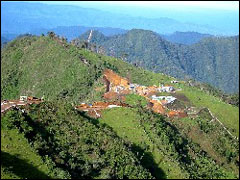
Rescue Monitoring
Rescue Monitoring is another activity developed
within this program. This consists in providing
protection to animals found during the opening
of the Right of Way. In the event that the animals
found are wounded, these are sent to the recovery
center that the Polytechnic school has in Tumbaco
until they improve their condition. Within this
monitoring of fauna there is an important aspect,
which is the special Ornithological Monitoring.
This carried out in Mindo where the OCP monitoring
team in coordination with Cecia and Birdlife evaluate
an a monthly basis the impact produced upon birds
as a result of the construction of the OCP.
 THE ENVIRONMENTAL IMPACT STUDY
THE ENVIRONMENTAL IMPACT STUDY |
In order to evaluate the environmental impact
of OCP construction and operation, an Environmental
Impact Study (EIS) was undertaken by an interdisciplinary
group and approved by the Undersecretary of Environmental
Protection of the Ministry of Energy and Mines
and by the Ministry of Environment.
The main objectives of the environmental study
of the OCP project were:
-Assess the impact of each phase of the project.
-Ensure that all proposed stages of development
comply with accepted national and International
environmental management practices.
-Identify applicable environmental rules and regulations.
-Identify socio-economic implications of the project
and involve the population to take into account
their concerns and complaints.
-Recommend environmental protection and control
measures.
 OCP CONTRIBUTION TO THE ECONOMY OF THE COUNTRY
OCP CONTRIBUTION TO THE ECONOMY OF THE COUNTRY
|
Along with the direct impact in reactivating
production and providing a dynamic quality to
employment opportunities, the OCP generates multiplying
effects upon a variety of economic sectors that
are related to the construction of the project.
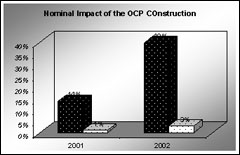
Nominal Effect Upon Goss Domestic Product
(GDP)
One of the ways in which we can visualize the
economic benefits of the construction of the OCP
on production in Country is through the direct
effect that this project has had in the construction
sector and on the Gross Domestic Product (GDP).
According to the Central bank of Ecuador in 2002,
Ecuador received from OCP S.A. an investment of
756$ million, an amount that represents a 40%
of the total spent in of the construction sector($
1.891 million) , and 3,1% of GDP which reached
$24. 417 million during the previous years
OCP imports are reflected in Trade Balance.
The construction of the OCP involved the importation
of diverse types of materials such as: pipes,
pumps, equipment for storage tanks and replacement
parts among others. This great volume of purchases
made abroad has no doubt had an impact upon the
trade balance of the country.
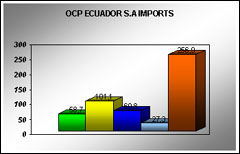
According to BCE, between January a November
2002 only OCP S.A imported a total of $257 million,
which represents a 15 % of the total imports of
capital goods of the country, which reached $1.762
million as of those months. Naturally, this effect
would be considerably increased if we include
the imports that have been made by Techint Sub-contractors.
Generation of direct Employment
In term of employment, the project has exceeded
all expectations. Initially had been estimated
that the project would incorporate 7000 workers.
During the peak of activities, through OCP, Techint
and subcontractors, there were more than 10.700
people working, 91% of which are Ecuadorians.
If we consider that on the average there are
four members per family we can project the fact
that the construction of the oil pipeline during
the moments of the most intense activity, provided
direct benefits to 43.000 fellow citizens, the
majority of which belong to sectors of limited
economic resources. On a geographic basis, the
greatest benefits in terms of direct employment,
took place in the four regions of the area of
influence of the project: Esmeralda, Pichincha,
Napo and sucumbios. It is important to point out
that 94% of the labour force includes skilled
and semi-skilled workers such as thousands of
helpers, operators, labourers, welders, carpenters,
grinders, etc.
Geographic distribution of the 8.159 Ecuadorians
that have been hired by Techint and its Subcontractors.
January 12, 2003.
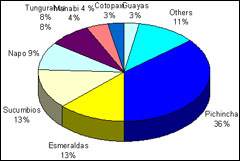
Multiplying effect
In addition contributing to the dynamic of the
construction sector, which achieved real rates
of expansion in the area of 10.5% in 2002, the
OCP Project has generated a multiplying effect
in several economic areas such as agriculture,
livestock, fishing, cement production, transport,
mechanical services, spare parts, fuels, textiles,
hotels, restaurants among others. According to
Central Bank survey among 192 companies that are
representative of the various economic sectors,
between January and October 2002, there was a
215 % growth in their sales, when compared to
the same period of the year before.
|

